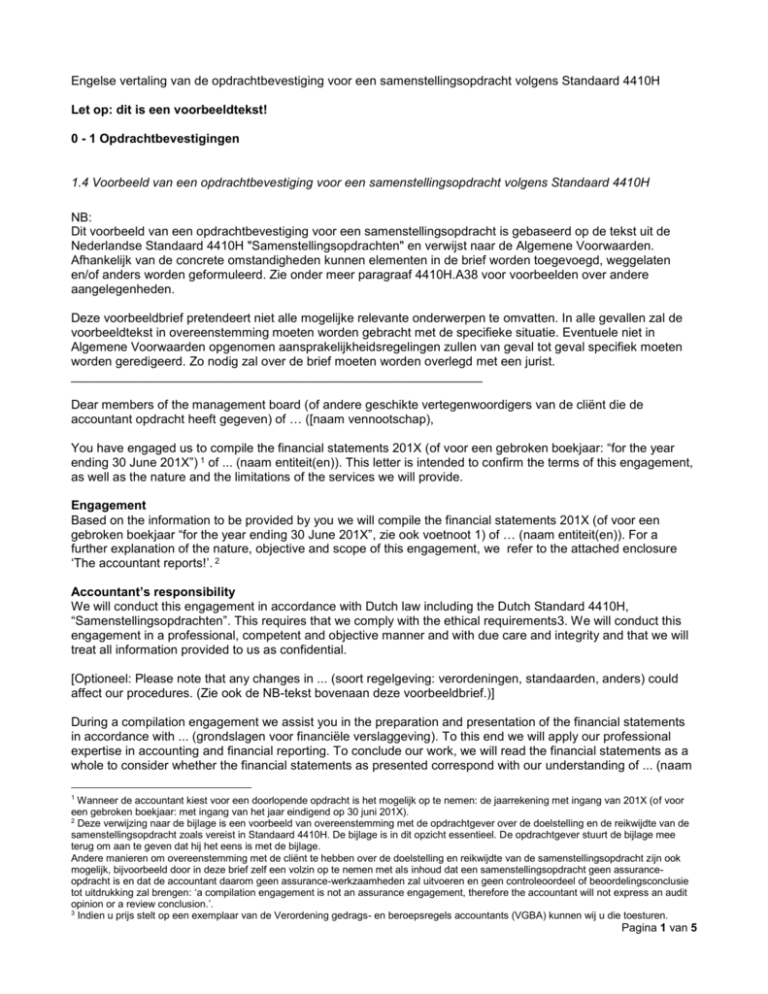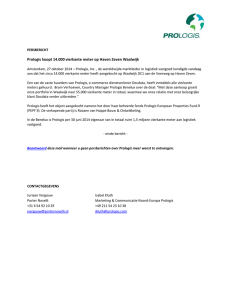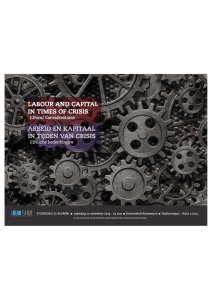1.4 Voorbeeld van een opdrachtbevestiging voor een
advertisement

Engelse vertaling van de opdrachtbevestiging voor een samenstellingsopdracht volgens Standaard 4410H Let op: dit is een voorbeeldtekst! 0 - 1 Opdrachtbevestigingen 1.4 Voorbeeld van een opdrachtbevestiging voor een samenstellingsopdracht volgens Standaard 4410H NB: Dit voorbeeld van een opdrachtbevestiging voor een samenstellingsopdracht is gebaseerd op de tekst uit de Nederlandse Standaard 4410H "Samenstellingsopdrachten" en verwijst naar de Algemene Voorwaarden. Afhankelijk van de concrete omstandigheden kunnen elementen in de brief worden toegevoegd, weggelaten en/of anders worden geformuleerd. Zie onder meer paragraaf 4410H.A38 voor voorbeelden over andere aangelegenheden. Deze voorbeeldbrief pretendeert niet alle mogelijke relevante onderwerpen te omvatten. In alle gevallen zal de voorbeeldtekst in overeenstemming moeten worden gebracht met de specifieke situatie. Eventuele niet in Algemene Voorwaarden opgenomen aansprakelijkheidsregelingen zullen van geval tot geval specifiek moeten worden geredigeerd. Zo nodig zal over de brief moeten worden overlegd met een jurist. ___________________________________________________________ Dear members of the management board (of andere geschikte vertegenwoordigers van de cliënt die de accountant opdracht heeft gegeven) of … ([naam vennootschap), You have engaged us to compile the financial statements 201X (of voor een gebroken boekjaar: “for the year ending 30 June 201X”) 1 of ... (naam entiteit(en)). This letter is intended to confirm the terms of this engagement, as well as the nature and the limitations of the services we will provide. Engagement Based on the information to be provided by you we will compile the financial statements 201X (of voor een gebroken boekjaar “for the year ending 30 June 201X”, zie ook voetnoot 1) of … (naam entiteit(en)). For a further explanation of the nature, objective and scope of this engagement, we refer to the attached enclosure ‘The accountant reports!’. 2 Accountant’s responsibility We will conduct this engagement in accordance with Dutch law including the Dutch Standard 4410H, “Samenstellingsopdrachten”. This requires that we comply with the ethical requirements3. We will conduct this engagement in a professional, competent and objective manner and with due care and integrity and that we will treat all information provided to us as confidential. [Optioneel: Please note that any changes in ... (soort regelgeving: verordeningen, standaarden, anders) could affect our procedures. (Zie ook de NB-tekst bovenaan deze voorbeeldbrief.)] During a compilation engagement we assist you in the preparation and presentation of the financial statements in accordance with ... (grondslagen voor financiële verslaggeving). To this end we will apply our professional expertise in accounting and financial reporting. To conclude our work, we will read the financial statements as a whole to consider whether the financial statements as presented correspond with our understanding of ... (naam 1 Wanneer de accountant kiest voor een doorlopende opdracht is het mogelijk op te nemen: de jaarrekening met ingang van 201X (of voor een gebroken boekjaar: met ingang van het jaar eindigend op 30 juni 201X). 2 Deze verwijzing naar de bijlage is een voorbeeld van overeenstemming met de opdrachtgever over de doelstelling en de reikwijdte van de samenstellingsopdracht zoals vereist in Standaard 4410H. De bijlage is in dit opzicht essentieel. De opdrachtgever stuurt de bijlage mee terug om aan te geven dat hij het eens is met de bijlage. Andere manieren om overeenstemming met de cliënt te hebben over de doelstelling en reikwijdte van de samenstellingsopdracht zijn ook mogelijk, bijvoorbeeld door in deze brief zelf een volzin op te nemen met als inhoud dat een samenstellingsopdracht geen assuranceopdracht is en dat de accountant daarom geen assurance-werkzaamheden zal uitvoeren en geen controleoordeel of beoordelingsconclusie tot uitdrukking zal brengen: ‘a compilation engagement is not an assurance engagement, therefore the accountant will not express an audit opinion or a review conclusion.’. 3 Indien u prijs stelt op een exemplaar van de Verordening gedrags- en beroepsregels accountants (VGBA) kunnen wij u die toesturen. Pagina 1 van 5 entiteit(en)). Management’s responsibility By signing this engagement letter you acknowledge and understand that you [and the supervisory body] are responsible for: The financial statements including the preparation and presentation thereof; Maintaining proper accounts, the use of an adequate system of internal control and the selection and application of the accounting policies in accordance with the intended use of the financial statements; The accuracy and completeness of the information to be provided to us; and The judgements needed in the preparation and presentation of the financial statements, including those for which we may provide assistance in the course of the compilation engagement. We are confident in receiving the full cooperation from your staff and trust that all records, documentation and other information necessary for conducting our engagement will be provided to us. Fraud and non-compliance Our engagement is not designed to detect fraud or error or illegal acts. However, we will inform you of any such matters should they come to our attention. The primary responsibility for the prevention and detection of fraud and error rests with both the supervisory body and the management board of the entity. We are neither responsible nor accountable for the prevention of fraud and error. Report We will report to you, in accordance with our findings, through a compilation report on the financial statements [optioneel: two separate compilations reports, one on the company financial statements, and one on the consolidated financial statements]. Please find enclosed [an] example[s] of the expected compilation report[s]. The form and content of our report may need to be amended in the light of our findings. We will compile the financial statements in accordance with … (de van toepassing zijnde grondslagen voor de financiële verslaggeving). You have informed us that the intended use and distribution of the information compiled by us is intended for … (specificeren). Should this change significantly, you have agreed to inform us. Furthermore, we would like to draw your attention to the fact that you are not allowed to publish the compilation report without our written permission. Act on the prevention of money laundering and terrorist financing Under the Act on the prevention of money laundering and terrorist financing (“Wet ter voorkoming van witwassen en financiering van terrorisme” - Wwft) we have to carry out a customer due diligence. Furthermore, this act obliges us to report unusual transactions carried out or intended at or by a client to the Financial Intelligence Unit Nederland in Zoetermeer. Fees Our fees are based on the time spent by the members of our team, plus expenses. Individual hourly rates vary according to the degree of responsibility involved and the experience and skill required. We will issue monthly invoices, based on the progress of the work. Our payment terms are …. days. Validity and General Terms and Conditions This engagement letter will remain valid until the engagement is completed, modified or replaced by another engagement. The services we provide are subject to the General Terms and Conditions, a copy of which is enclosed. By signing and returning this engagement letter you acknowledge receipt and acceptance of the above mentioned General Terms and Conditions. Electronic Communications During the execution of the engagement, at your request, we both can communicate with one another using electronic means. We both shall not be liable towards one another for any loss or damage that may be sustained by either or each of us as a result of the use of electronic means of communication, including – but not restricted to – loss or damage due to non-delivery or delayed delivery of electronic communication, interception or Pagina 2 van 5 manipulation of electronic communication by third parties or by software/equipment used for transmitting, receiving or processing electronic communication, transmission of viruses and the failure or poor functioning of the telecommunications network or other resources required for electronic communication, unless the loss or damage is the result of wilful misconduct or gross negligence. We both will do or omit to do everything that may reasonably be expected of each of us in order to prevent the risks referred to above from occurring. The data abstracts from the sender's computer systems shall constitute conclusive evidence of (the content of) the electronic communication sent by the sender until such time as evidence to the contrary is furnished by the receiver. Confirmation We are very pleased to accept the engagement. Should you require any further information, please do not hesitate to contact us. If you accept the contents of this letter as being correct, please sign and return the enclosed copy including the attached enclosure ‘The accountant reports!’ as a confirmation that it faithfully reflects the matters on which we have agreed. Yours sincerely, ... (naam accountantspraktijk) … (naam accountant) Signed for approval on behalf of … (naam entiteit(en)) by … (naam en functie) … (datum ondertekening) Enclosures: ‘The accountant reports!’ with explanation of the compilation engagement (attached to this letter) General Terms and Conditions Example[s] of the expected compilation report[s] Copy of this letter and annexed attachment ‘The accountant reports!’ with explanation of the compilation engagement Pagina 3 van 5 The accountant reports! Explanation for users of the compilation report issued by an accountant An accountant may carry out different types of engagements on historical financial information, depending on the request of the client (hereafter: the organisation or its management) or users’ information needs. He reports on the engagement by issuing a report. The most common reports are the reports on financial statements. This can be either: A compilation report – the accountant assists the client with the preparation of the financial statements; An auditor’s report – the accountant (auditor) provides an opinion on the financial statements with reasonable assurance; or A review report – the accountant provides a conclusion with limited assurance. Regardless of the type of engagement, an accountant should always act in a professional, competent and objective manner, and with due care and integrity, and treat information as confidential. Compilation report When an accountant assists the organisation’s management with the preparation of the financial statements, he issues a compilation report. This report contains the following information: The nature of the engagement The responsibilities of management The responsibilities of the accountant Since the accountant assists management with the preparation of the financial statements, he therefore uses the information provided by management. The accountant does not normally examine whether this information is correct. The accountant sometimes assists management in making accounting estimates or by selecting suitable accounting policies. He will always discuss this with management and ensure that management understands the choices made, to ensure that management can take responsibility for the financial statements. When the financial statements have been compiled, the accountant will read the financial statements in light with his understanding of the organisation. If the accountant believes that the information provided by management is incomplete or inaccurate, he will request management for additional information. If necessary he himself will propose adjustments . If the accountant is unable to complete the engagement due to lack of information provided by management or its refusal to make adjustments to the financial statements, he withdraws from the engagement. In that case he informs those charged with governance, such as the supervisory board, when such body exists. Because the accountant assists management with the preparation of the financial statements, he does not express an opinion or a conclusion on the financial statements. If the users of the financial statements request an opinion or a conclusion, he should perform an audit or a review engagement. Auditor’s report In an audit engagement the accountant verifies whether the financial statements prepared by management provide a fair presentation of the financial situation of the organisation. In the auditor’s report, he expresses his independent audit opinion. He does this for users of financial statements, such as shareholders, suppliers and banks, which make economic decisions based on the information in the financial statements. The financial statements must give a true and fair view of the organisation's financial position and its result. But this does not mean that the financial statements must be accurate down to the last euro. The financial statements must be accurate enough for the common user to be able to make informed decisions based on them. In other words, the financial statements must be free of material misstatements. The objective of an audit engagement is to enable the accountant to express with a high level of assurance whether the financial statements are free from material misstatement. The accountant does not provide an absolute level of assurance, because he can be intentionally misled by an organisation, the accounting Pagina 4 van 5 estimates made in the financial statements are often subjective, and because it is not economically feasible to investigate all individual transactions. This is what the accountant means with reasonable assurance. The accountant carries out extensive procedures in order to support his opinion. For example, he will: Identify areas where material misstatements are likely to arise and perform adequate audit procedures as response Investigate sales and purchasing transactions Attend at a physical inventory counting Ask a customer to confirm an account balance Perform analytical procedures Make inquiries of management and others in- and outside the organisation. The vast majority of the issued auditor’s reports are unmodified. This is due to the fact that any material misstatement is corrected by the organisation in consultation with the auditor before the report is issued. However, it is also possible that material misstatements exist in the financial statements . Depending on the pervasiveness of the misstatements, the accountant can express an adverse opinion or a qualified opinion. Sometimes the accountant doesn’t have sufficient and appropriate audit evidence to support his opinion on the financial statements. Depending on the pervasiveness of this, he expresses a disclaimer of opinion or a qualified opinion. Because the accountant expresses an opinion in his report and users must be able to rely on this, it is important that he is independent. He must therefore comply with independence regulations. Review report Also in a review engagement the independent accountant examines whether the financial statements provide a fair presentation of the financial situation of the organisation. However, the accountant performs less procedures. These procedures will mainly consist of: Identifying areas where material misstatements are likely to arise and perform adequate procedures as response Making inquiries of management and others, and Performing analytical procedures. Because less procedures are performed by the accountant, he will provide less assurance on the financial statements. His conclusion provides limited assurance. The choice for the level of assurance depends on the users' demand for assurance in relation to costs. If the accountant believes that the financial statements are not free from material misstatements, he performs additional procedures. In the review report the accountant states: ‘nothing has come to our attention that causes us to believe that the financial statements do not give a true an fair view of the financial position and the result of the company’. In doing so he reports that the information in the financial statements seems plausible. As in an audit engagement the accountant may also conclude that the financial statements are incorrect or that he cannot obtain sufficient and appropriate evidence about the financial statements. To express this he modifies his conclusion. Pagina 5 van 5


